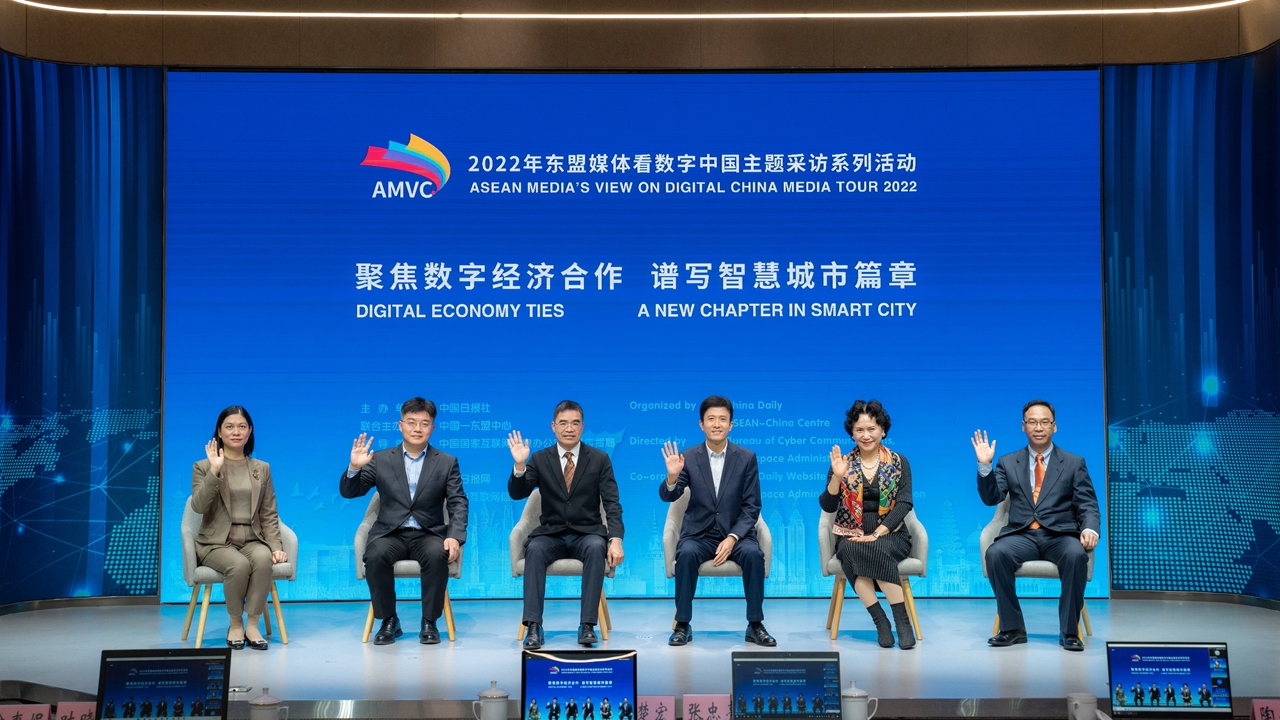Seminar spotlights digital economy, smart city
Writer: Wang Jingli | Editor: Zhang Chanwen | From: Shenzhen Daily | Updated: 2022-12-08
A+ A- Print
A virtual seminar on ASEAN Media’s View on Digital China was held yesterday afternoon, with a subvenue set up in Shenzhen.
The seminar, part of ASEAN Media’s View on Digital China Media Tour 2022, spotlighted “digital economy ties” and “a new chapter in smart city,” where experts, representatives from companies and institutions, and government officials from China and ASEAN (the Association of Southeast Asian Nations) countries shared their visions on the two topics.

Attendees of a seminar on ASEAN Media’s View on Digital China gesture at the Shenzhen subvenue yesterday. Lin Jianping
Tao Yitao, professor and former deputy Party chief of Shenzhen University and dean of the Belt and Road Research Institute of Shenzhen University, introduced Shenzhen’s digital economy achievements from five aspects and the role of mechanism innovation in boosting the city’s digital economy development.
The added value of the core industries of Shenzhen’s digital economy last year exceeded 900 billion yuan (US$128.8 billion), accounting for 30.5% of the city’s GDP.
As of 2021, Shenzhen had built over 50,000 5G stations. In addition, the city ranks first in terms of information society index as well as online government service capability index, according to related reports released by the national authorities.
Moreover, Shenzhen has cultivated a batch of leading enterprises involved in the digital economy sector such as Huawei, ZTE, Tencent and Ping An.
Huang Runzhong, chief supervisor of One Connect of Ping An Insurance (Group) Co. of China, highlighted new opportunities for digital development and shared the company’s effective practices in digitalization.
Wang Hao, deputy editor-in-chief of China Daily, said in his opening remarks that digital economy together with smart city became the two key fields for cooperation between China and the ASEAN, with fruitful results achieved. Wang said that digital development also offered a great opportunity for media to pursue innovative development to tell stories well.
This year marks the first year after the formal establishment of a comprehensive strategic partnership between the ASEAN and China, and the Regional Comprehensive Economic Partnership (RCEP) took effect this January. The partnerships showed the importance of organizing the seminar, according to Zhang Yong, deputy director of the Cyber Communications Bureau of the Cyberspace Administration of China.
H.E. Arthayudh Srisamoot, ambassador of Thailand to China, introduced Thailand’s digital development in his speech and suggested that Thailand is expanding its 5G network coverage. He hoped for continued cooperation among Thailand, China and the ASEAN.
Shi Zhongjun, secretary-general of the ASEAN-China Center, observed that there are huge cooperation potentials in the digital economy and smart city fields and hoped the center could continue to serve as a bridge for ASEAN-China cooperation.